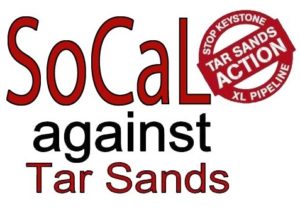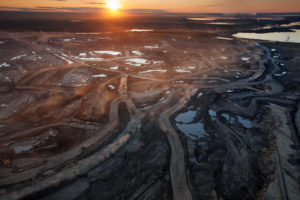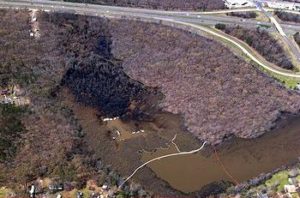The State Department has issued a flawed environmental review of the proposed Keystone XL pipeline that ignores its far-reaching impacts on climate and our environment. Tar Sands Action Southern California has prepared a commentary on behalf of 40 groups to be submitted to the State Department demanding a comprehensive reassessment of the significant and irreversible impacts on the environment not taken into account in the draft report released on March 1st. As of April 22, 2013, individuals can also send a message asking President Obama to reject the review, send the State Department back to the drawing board, and fulfill his promise to address climate change. See the links below.

The Honorable John Kerry
Secretary
U.S. Department of State
2201 C Street, N.W.
Washington, DC 20520
Email: keystonecomments@state.gov
RE: Comments on the Draft Supplemental EIS on the Proposed Keystone XL Pipeline (EIS No. 20130056)
Dear Secretary Kerry:
Tar Sands Action Southern California and 40 environmentally concerned organizations, businesses, and political representatives thank the US State Department for the opportunity to comment on this Draft Supplemental Environmental Impact Statement (SEIS). We make up a coalition of organizations from all over Southern California expressing grave concerns with the draft review of this project. We suggest, on the basis of impacts to land, water, air and global climate, the Keystone XL Pipeline is not in the US national interest and should be rejected. The following are our comments on the draft SEIS.
Summary of Comments
Keystone XL Growth Inducing Impacts on Canadian Tar Sands
Canada’s tar sands industry has an ambitious long-term growth strategy inextricably linked to oil demand from the United States. This growth is projected to cause a doubling of the industry’s climate emissions within the next decade and would be the central reason why Canada fails to meet its carbon reduction targets. To achieve this growth the tar sands industry relies on large export pipelines to transport bitumen to the United States. If the tar sands industry is to realize its 5 million barrels per day production goal by 2030, all existing pipeline proposals will need to be built.


Impacts to Land, Water, Air, and Cultural Resources
The Canadian tar sands (the Western Canadian Sedimentary Basin) have been called the “most environmentally destructive project on earth,” with good reason. Extracting tar sands bitumen from under the Northern Boreal forests of Alberta, Canada requires huge amounts of energy and water. It has cleared vast tracts of forest, left scars on the land that are visible from space and threatened the health and livelihoods of indigenous First Nations communities across the region. The impact to land, water, air and cultural resources from the Keystone XL-enabled tar sands region of Alberta would be significant, unavoidable and irreversible.
Climate Implications of the Keystone XL
Full exploitation of the tar sands would create a grave threat to the global climate. The Environmental Protection Agency (EPA) estimates that by pipelining 830,000 bpd of tar sands instead of conventional crude, Keystone XL will increase annual U.S. CO2 emissions by up to 27 million metric tons – the impact of adding about 5 million cars on the road. Additionally, tar sands processing produces a by-product called petroleum-coke, which can be used in coal-fired power plants and will release significant amounts of greenhouse gases that must be accounted for in this analysis.


Risks from Spills, Accidents, Blowouts from Tar Sands Pipelines
Transportation of tar sands diluted bitumen through pipelines also poses a significant, unavoidable, and potentially irreversible impact from spills to major rivers, streams and the Ogallala Aquifer, which support significant proportions of US agricultural products and drinking water for six US states.
Overall, we request that more attention to impacts be assessed on the issues of Tar Sands Market Analysis, Greenhouse Gas Emissions, Impacts to the Global Climate, and Impacts to Water Resources from Potential Releases.
Read the letter signed by 37 Southern California organizations, businesses, and political representatives to be submitted by April 22, 2013, from Jack Eidt, Organizer, Tar Sands Action SoCal and Director of Wild Heritage Planners.
Comment Letter – Click Here: Keystone SEIS Comments – Tar Sands Action SoCal V2
Send your own comments to Email: keystonecomments@state.gov
Join the Facebook 5,000 Comment Challenge: Click here
For more information on Tar Sands and Keystone XL: Click here.
httpvh://youtu.be/qYUMYCCOx6I
“What is that pipeline?” By Aja Janae
Comments submitted on behalf of the following 40 organizations, businesses, or political representatives:
| Allesandro’s Chapter of Coalition for Educational Justice
Ronni Solman CEJ Steering Committee Member |
Los Angeles Green Festival
Laurie Kaufman Regional Director |
| Amazon Watch
Atossa Soltani Executive Director |
Los Angeles Greens + Green Party of Los Angeles County Council
Kamran Ghasri LA County Outreach & Tabling Committee Co-Chair |
| Arroyo S.E.C.O Network of Time Banks
Autumn Rooney Co-Director |
Martin Luther King Coalition of Los Angeles
Kwazi Nkrumah and Julie Levine Co-Chairs |
| Arts:Earth Partnership
Adam Meltzer Director of Operations |
Miss R*EVOLutionaries
Nanette Harrison Co-Founder, Social Media Director Sherry Anne Lear Co-Founder, Political Action Director |
| Burbank Green Alliance
Jessica Aldridge Executive Director |
Mt. San Antonio College Environmental Action Group for a Livable Earth
Michelle Marin Club President |
| California League of Conservation Voters
David Allgood Political Director |
Northeast Los Angeles Transition
Therese Brummel Co-Founder |
| Citizens Climate Lobby
Mark Reynolds Executive Director |
Occupy Long Beach
Sonny Pencr Member |
| CODEPINK
Jodie Evans Co-Founder |
Planet Rehab
Gary Mitchell Executive Director |
| CRSP Institute for Urban Ecovillages
Lois Arkin Executive Director |
Residents Organized For a Safe Environment-Wattless Wednesday
Gene Stone Founder-Conservation Activist, CA Chapter Head |
| Food & Water Watch
Alexandra Nagy Organizer |
SanDiego350.org
Masada Disenhouse Steering Committee Member |
| Idle No More LA
Lydia Ponce |
Sierra Club Beyond Coal
Aura Vasquez Organizing Representative |
| LA Progressive
Dick Price & Sharon Kyle Editor & Publisher |
Sierra Club, Angeles Chapter
Al Sattler Chair, Angeles Chapter Climate Change Committee |
| League of Women Voters of Los Angeles
Margie Engel Chair, Climate Change Cmte. |
The Appropriate Omnivore
Aaron Zober |
| Leslie Iwerks Productions, Inc.
Leslie Iwerks Owner, Filmmaker |
The Orange County Interfaith Coalition for the Environment
Margaret Henke President |
| Long Beach Coalition for a Safe Environment
Gabrielle Weeks Executive Director |
Transition San Fernando Valley
Bruce Woodside Steering Committee Member |
| Long Beach Greens
E.B. Gendel Co-Coordinator |
UrbanScooters.com
Frank Minero President |
| Los Angeles Bioneers
Sara R. Nichols Co-Founder |
WilderUtopia
Jerry Collamer Editor |
| Los Angeles City Councilmember Paul Koretz |













I don’t understand what the State Department has to do with the Keystone XL pipeline. Isn’t that the jurisdiction of the Department of the Interior?
How many actually paid attention to what Obama said in 2008?
“All of us feel the impact of the global energy crisis. In the short-term, it means an ever-more expensive addiction to oil, which bankrolls petro-powered authoritarianism (President Hugo Chavez) around the globe, and drives up the cost of everything from a tank of gas to dinner on the table.
…
Leadership must begin at home. That’s why I’ve proposed a CAP AND TRADE SYSTEM to limit our carbon emissions and to invest in alternative sources of energy. We’ll allow industrial emitters to offset a portion of this cost by investing in low carbon energy projects in Latin America and the Caribbean. And we’ll increase research and development across the Americas in CLEAN COAL TECHNOLOGY, in the next generation of sustainable biofuels not taken from food crops, and in wind and solar energy.
…
We’ll assess the opportunities and risks of NUCLEAR POWER in the hemisphere by sitting down with Mexico, Brazil, Argentina and Chile…
Senator Obama’s remarks to the Cuban American National Foundation (a terrorist group), May 23, 2008
Clearly, Mr. Obama is a clean-energy pretender who maybe actually believes clean coal exists, but by banding together and speaking out, we become a counter-balance to the money of the Koch-Bros-et-al, and possibly force an environmental review that takes into account established science and credible risk analysis. With these words put into the public record, the probable litigation against the State Dept review has more teeth.
Pingback: Waxman To Deliver LA Climate Orgs Message to the President | WilderUtopia.com
Pingback: Keystone XL Activists Greet Obama in Santa Monica | WilderUtopia.com
Pingback: Obama Proposes Measured Action on Climate Change | WilderUtopia.com